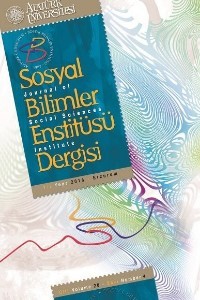Chinua Achebe’s African Trilogy: Culture and Identity in Things Fall Apart, No Longer At Ease, Arrow of God
Abstract
Chinua Achebe, one of the most important representatives of postcolonial literature, has explored the most important concepts of the discourse in his African trilogy. Bringing forward significant concepts in his novels Things Fall Apart, No Longer At Ease and Arrow of God such as culture, identity, alienation, hybridity, in-betweenness, corruption and assimilation, Achebe has revealed all the details of colonialism and post-independence periods experienced by the African geography through the main characters. The author, who also refers to the pre-colonial period, does not base the downfall, corruption and falling apart solely on colonial policies and practices, showing that there are unresolved issues and problems in tribal cultures as well. Reflections of tensions between primitive societies, wars, struggles, examples of discrimination and exclusion have made Achebe one of the pioneers of postcolonial literature. Black Africa's struggle with White Europe offers openness to all sorts of relationships. Belief system, culture, identity and lifestyle are seen as the most suitable cases for cultural erosion in this struggle.
Keywords
Post-colonialism Chinua Achebe identity culture Things Fall Apart No Longer At Ease Arrow of God
References
- Achebe, C., (2011) Parçalanma, İthaki Yayınları, İstanbul.
- Achebe, C., (2012) Artık Huzur Yok, İthaki Yayınları, İstanbul.
- Achebe, C., (2013) Tanrının Oku, İthaki Yayınları, İstanbul.
- Ashcroft, B., Griffiths, G., Tiffin, H., (2007) Postcolonial Studies: The Key Concepts, Routledge, London and New York.
- Aning, J., Nsiah, J., (2012) “Political Myth and Achebe’s Arrow of God”, Journal of Science and Technology, Vol. 32, No. 2, pp. 68-77.
- Begam, R., (1997) “Achebe’s Sense of an Ending: History and Tragedy in Things Fall Apart”, Studies in the Novel, Vol. 29, No. 3, The Johns Hopkins University Press, pp. 396-411.
- Câmpu, A., (2013) “Tradition Versus Modernity in Chinua Achebe’s No Longer At Ease”, Bulletin of the Transilvania University of Braşov, Series IV: Philology and Cultural Studies, Vol. 6 (55), No. 2.
- Geçikli, K., (2014) “Against Dehumanization: Re-humanization in J. M. Coetzee’s Work”, Littera Edebiyat Yazıları, Vol. 35, Ankara, pp. 59-68.
- Geçikli, K., (2015) “Orientalisation of the Occident: Nadeem Aslam’s Maps for Lost Lovers”, Interactions, Vol. 24, No. 1, Ege University Press, İzmir.
- Killam, G. D., (1971) “Chinua Achebe’s Novels”, The Sewanee Review, Vol. 79, No. 4, The Johns Hopkins University Press, pp. 514-541.
- Olufunwa, H., (2005) “Achebe’s Spatial Temporalities: Literary Chronotopes in Things Fall Apart and Arrow of God”, Critical Survey, Vol. 17, No. 3, Berghahn Books, pp. 49-65.
- Rhoads, D. A., (1993) “Culture in Chinua Achebe’s Things Fall Apart”, African Studies Review, Cambridge University Press, Vol. 36, No. 2, pp. 61-72.
- Semwal, S., (2013) “Colonial Conflicts leads to Alienation and Rootlessness in Achebe’s No Longer at Ease”, IOSR Journal of Humanities and Social Science, Volume 8, Issue 6, pp 26-30.
- Udofia, J., (2014) “Arrow of God and the Sanctity of Spiritual Values”, An African Journal of New Writing, Number 52, pp. 105-119.
Abstract
References
- Achebe, C., (2011) Parçalanma, İthaki Yayınları, İstanbul.
- Achebe, C., (2012) Artık Huzur Yok, İthaki Yayınları, İstanbul.
- Achebe, C., (2013) Tanrının Oku, İthaki Yayınları, İstanbul.
- Ashcroft, B., Griffiths, G., Tiffin, H., (2007) Postcolonial Studies: The Key Concepts, Routledge, London and New York.
- Aning, J., Nsiah, J., (2012) “Political Myth and Achebe’s Arrow of God”, Journal of Science and Technology, Vol. 32, No. 2, pp. 68-77.
- Begam, R., (1997) “Achebe’s Sense of an Ending: History and Tragedy in Things Fall Apart”, Studies in the Novel, Vol. 29, No. 3, The Johns Hopkins University Press, pp. 396-411.
- Câmpu, A., (2013) “Tradition Versus Modernity in Chinua Achebe’s No Longer At Ease”, Bulletin of the Transilvania University of Braşov, Series IV: Philology and Cultural Studies, Vol. 6 (55), No. 2.
- Geçikli, K., (2014) “Against Dehumanization: Re-humanization in J. M. Coetzee’s Work”, Littera Edebiyat Yazıları, Vol. 35, Ankara, pp. 59-68.
- Geçikli, K., (2015) “Orientalisation of the Occident: Nadeem Aslam’s Maps for Lost Lovers”, Interactions, Vol. 24, No. 1, Ege University Press, İzmir.
- Killam, G. D., (1971) “Chinua Achebe’s Novels”, The Sewanee Review, Vol. 79, No. 4, The Johns Hopkins University Press, pp. 514-541.
- Olufunwa, H., (2005) “Achebe’s Spatial Temporalities: Literary Chronotopes in Things Fall Apart and Arrow of God”, Critical Survey, Vol. 17, No. 3, Berghahn Books, pp. 49-65.
- Rhoads, D. A., (1993) “Culture in Chinua Achebe’s Things Fall Apart”, African Studies Review, Cambridge University Press, Vol. 36, No. 2, pp. 61-72.
- Semwal, S., (2013) “Colonial Conflicts leads to Alienation and Rootlessness in Achebe’s No Longer at Ease”, IOSR Journal of Humanities and Social Science, Volume 8, Issue 6, pp 26-30.
- Udofia, J., (2014) “Arrow of God and the Sanctity of Spiritual Values”, An African Journal of New Writing, Number 52, pp. 105-119.
Details
| Primary Language | Turkish |
|---|---|
| Journal Section | Makaleler |
| Authors | |
| Publication Date | March 16, 2019 |
| Published in Issue | Year 2019 Volume: 23 Issue: 1 |



